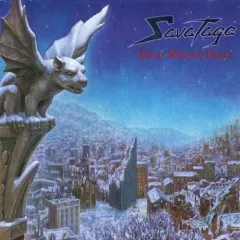
Bạn đang đọc: Lời bài hát Not What You See – Savatage
Thông tin bài hát
Tên bài hát: Not What You See
Ca sĩ: Savatage
Sáng tác: unknown
Album: Dead Winter Dead (Reissue)
Ngày ra mắt: 07/06/2011
Thể loại: Âu Mỹ, Rock
Lời bài hát Not What You See – Savatage
Not What You See
[Music & Words: Jon Oliva, Paul O’Neill]No life’s so short it can’t turn around
You can’t spend your life living underground
For from above you don’t hear a sound
And I’m out here, waiting
I don’t understand what you want me to be
It’s the dark you’re hating, it’s not who I am
But I know that it’s all that you see
No life’s so short that it never learns
No flame so small that it never burns
No page so sure that it never turns
And I’m out here, waiting
I don’t understand what you want me to be
It’s the dark you’re hating, it’s not who I am
But I know that it’s all that you see
Never hear a word that they say as the wheels go around
Tell me if you win would it show – in a thousand years, who would know?
As a million lives come and go on this same piece of ground
Can you live your life in a day
I’ve been waiting
Putting every moment in play?
Never hear a word that they say
I don’t understand what you want me to be
As the wheels go around
Tell me if you win would it show
It’s the dark you’re hating
In a thousand years, who would know?
As a million lives come and go
It’s not who I am, but it is what you see
On this same piece of ground
I don’t understand what you want me to be
It’s the dark you’re hating
It’s not who I am, but it is what you see [2.] Can you live your life in a day
Putting every moment in play?
Never hear a word that they say
As the wheels go around
Tell me if you win would it show
In a thousand years, who would know?
As a million lives come and go
On this same piece of ground [3.] Tell me would you really want to
See me leave this night without you
Would you ever look about you
Wondering where we might be
New York is so far away now
Tokyo, Berlin and Moscow
Only dreams from here but somehow
One day that world we will see [simultaneously again, except substitute this for stanza 1 and] [clip last three syllables of the last line of stanzas 2 and 3] [1.] I don’t understand
I don’t understand
I don’t understand
I don’t understand
I don’t understand
I don’t understand
I don’t understand
I don’t understand… [together, immediately]
…what I see.
[solo] [coda] I swear on tomorrow, if you take this chanceOur lives are this moment, the music – the dance
And here in this labyrinth of lost mysteries
I close my eyes on this night and you’re all that I see
You’re all that I see
THEN THEY LEFT THE SQUARE TOGETHER
NEATH THE FADING FIRE’S LIGHT
AND THE GARGOYLE WATCHED
AND WONDERED
ON THAT WINTER’S SILENT NIGHT
AND SO OUR STORY’S OVER
AND FOR ANY ONE WHO CARES
AS FOR THE OLD GARGOYLE
I BELIEVE THAT HE’S STILL THERE
Story.
In the Bosnian capital of Sarajevo, there is a town square surrounded
by buildings that were constructed during the middle ages. The
square has a beautiful stone stone fountain at its center and at one
corner there is a thousand year old church with a gargoyle carved
into its belfry. Now this gargoyle, for the last thousand years, has
spent all his time trying to comprehend the human emotions of laughter
and sorrow. But even after a millennium of contemplation, these most
curious of human attributes remain a total mystery to our stone friend.
Our story begins in the year of 1990; the Berlin Wall has just fallen,
communism has collapsed and for the first time since the Roman
Empire, Yugoslavia finds itself a free nation. Serdjan Aleskovic cannot
believe his good fortune to be alive and young at such a moment. The
future and the happiness of all seem assured in what must surely be
“the best of times”.
However, even as Serdjan celebrates with his fellow countrymen, there
are little men with little minds who are already busy sowing the seeds
of hate between neighbors. Young and impressionable Serdjan joins
some of his friends in a Serbian Militia Unit and eventually finds himself
in the hills outside of Sarajevo firing mortar shells nightly in the city.
Meanwhile in Sarajevo itself, Katrina Brasic, a young Muslim girl, finds
herself buying weapons from a group of arms merchants and then
joining her comrades firing in the hills around the city.
The years pass by and it is now late November 1994. An old man who
had left Yugoslavia many decades before, has now returned to the city
of his birth, only to find it in ruins. As the season’s first snowfall
begins,
he stands in the town square, looks toward the heavens and explains
that when the Yugoslavians prayed for change, this is not what they
intended.
As the old man finished his prayer, the sun begins to set and the first
shells of the evening’s artillery barrage are starting to arc overhead. But
instead of heading for the shelters with the rest of the civilians, he climbs
atop the rubble that used to be the fountain and taking out his cello,
starts to play Mozart as the shells explode around him. From this night
forward he would repeat this ritual every evening. And every evening
Serdjan and Katrina each find themselves listening to the thoughts of
Mozart and Beethoven as the drift between the explosions across no
man’s land.
Though the winter does its best to cover the landscape with a blanket
of temporary innocence, the war only escalates in violence and brutality.
One day in late December, Serdjan on a patrol in Sarajevo, comes
across a schoolyard where a recent exploding shell has left the ground
littered with the bodies of young children. It is one thing to drop shells
into a mortar and quite another to see where they land. Long after
Serdjan returns to his own lines, he cannot get the faces of the
children out of his mind. Realizing that what he has been participating
in is not the glorious nation building that their leaders had described,
but rather a path to mutual oblivion, he decides right then and there
that he can no longer be a part of this, that you cannot build a future
on the bodies of others. At the first opportunity, he resolves that he
will desert.
Sitting in his bunker on December 24th, he listens to the sounds of
Christmas carols from the old cello player mingling with the sounds
of war. Katrina, on the other side of the battlefield, is also listening.
It had just stopped snowing and the clouds had given way to reveal a
beautiful star-filled sky when suddenly the cellos player’s music
abruptly ceases. Fearing the worst, Serdjan and Katrina both do
something quite foolish and from their respectives sides, start to
make their ways across no man’s land toward the town square.
Arriving at the exact same moment, they see one another. Instinctively
realizing that they are both there for the same reason, they do not
start to fight, but instead, together walk slowly to the fountain. There
they find the old man lying dead in the snow, his face covered with
blood, his cello lying smashed and broken at his side.
Then without warning, a single drop liquid falls from the cloudless
sky, wiping some of the blood off the old man’s cheek. Serdjan looks
up, but he can see nothing except the stone gargoyle high up on the
church belfry. Overcome by what he has seen this night, he decides
that he must leave this war immediately. Turning to the Muslim girl
he asks her to come with him, but now all she sees is his Serbian
uniform. Pouring out his feelings, he explains that he is not what she
thinks that he is. Eventually winning her to his side, they leave the
night together.
